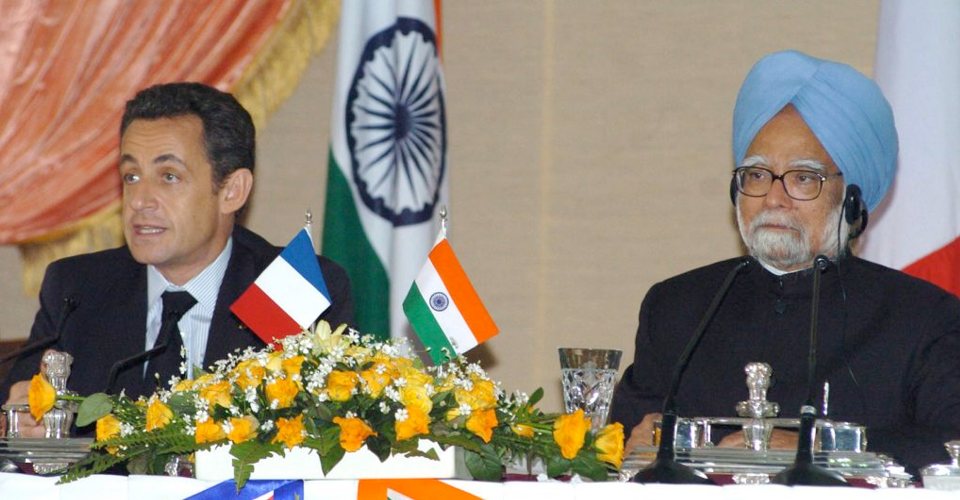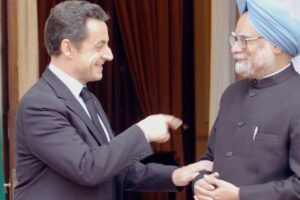- From Friendship to Partnership – January-March 2008 (Indian Defence Review)
TO GRASP THE INTRICACIES OF INDO-FRENCH relations in the field of defence and security, it is necessary to first have a look at some issues which may seem unrelated, but which will help us to understand the historical background and get clearer perspectives on the future.
- Sarkozy visit: Style but no substance – January 30, 2008 (Rediff.com)
In a way, President Nicolas Sarkozy’s visit to India was a mini media coup de boule. Even the most austere newspapers, without a famous (or infamous) page 3, covered the French president’s visit, speculating on a daily basis if the fiancee would be in the presidential plane (or later join him) for a darshan of the Taj Mahal…
- France’s Hyper President comes calling – January 24, 2008 (Rediff.com)
Diplomatically, January is a busy month. The Indian prime minister went to China, British Prime Minister Gordon Brown was in India this week while French President Nicolas Sarkozy will be the guest of honour for Republic Day. The French media has coined a term for the new French head of State: the ’Hyper President’. This is probably due to his hyperactive life as President and man; he was elected in May 2007 after he promised to take a new look at the presidency and re-energise old France, which is what he has strenuously been trying to do. Will he be able to perform the same feat for Indo-French relations is a question on many observers’ mind?
- Challenge for France – January 22, 2008 (The Pioneer)
For India, French President Nicolas Sarkozy’s visit will be an opportunity to strengthen bilateral relations and forge a meaningful strategic partnership. Of course, provided Sarkozy is interested and means business…
- The role of France – January 20, 2008 (New Indian Express)
On August 15, 1947, the British left the subcontinent and became the good guys. The French (and the Portuguese) were seen as villains because Paris still clung to its small ‘colonies’ in India. At the end of the 40’s, successive French governments were too weak to take any drastic decisions; Paris was also worried about creating a precedent for its other colonies in Indochina and North Africa. All this negatively affected the relations between India and France during the first years after Independence. Fortunately, the issue was solved in 1954 and Pondicherry merged into the Union of India.
- Why France matters – January 20, 2008 (sify.com)
As the protocol section of the Ministry of External Affairs goes frantic over whether to accord the French President’s companion Carla Bruni the status of the First Lady or that of a special invitee for the Republic Day jamboree, it is perhaps time to examine Indo-French relations through a wider prism.
During his campaign in May, the hyperactive Nicolas Sarkozy had promised to reenergise old France. Will he be able to perform the same feat for Indo-French relations? To answer this question, it is necessary to put the visit into a historical perspective.
- Indian defence and the Abominable No Men – December 31, 2007 (sify.com)
India’s defence sector is today facing one of the grimmest times since the debacle of 1962. Many will infer that it is because India is a democracy governed by the rule of law and not a totalitarian regime. It could be, let us first have a look at the facts…
- Billion Dollar Mystery – December 19, 2007 (The Pioneer)
With Washington patting its back, New Delhi has forgotten France stood by India when US imposed tough sanctions. Is that why it has cancelled the Eurocopter deal?
- Will an Indian PM ever go jogging? – July 1, 2007 (New Indian Express)
From our side of the planet, it is not difficult to grasp why France cannot compete with countries like China or India, which work much more for much less. Globalisation and delocalisation are here to stay and the Western society has no choice but to adapt itself to this new paradigm. However some of the President’s first reforms are nevertheless worth looking at by India too.
- The split between the two Frances – May 16, 2007 (Rediff.com)
On May 16, a new French President will occupy the Elysee Palace. Ten days earlier, forty million French voters, glued to their television sets, discovered behind a slowly fading tricolour national flag, the face of Nicolas Sarkozy who appeared standing in front of a photo of his new residence. He had been elected with 53 per cent of the votes. Segolene Royal was far behind with only 47 per cent…







